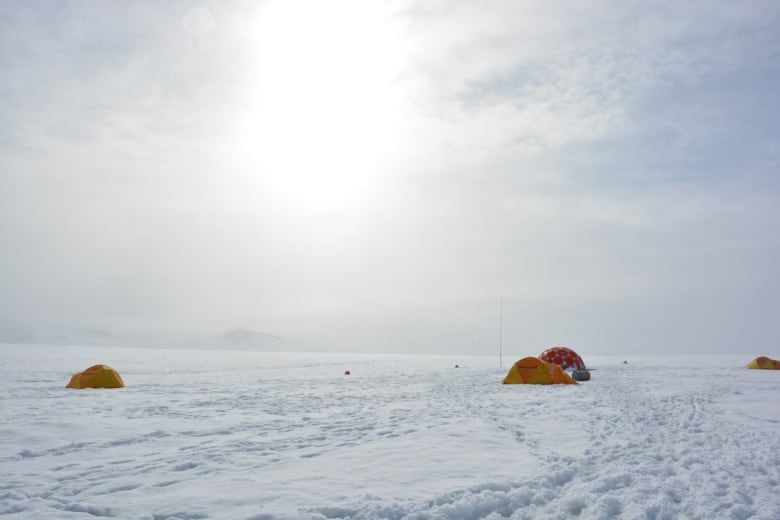Arctic Environmental Degredation
"Entire cities are that size. These are big pieces of ice." "This was the largest remaining intact ice shelf, and it's disintegrated, basically." "The very small ones, we're losing them dramatically." Luke Copland, glaciologist University of Ottawa
"We saw them going, like someone with terminal cancer. It was only a matter of time." "When I was there in the 1980s I knew every square inch of those ice caps. You have the memories. It's like your first girlfriend." "I knew them as friends too, you know, and now they're gone.... It's like losing an old friend." "We're in control of the climate now. Basically, we've taken on the reins.... So unless we as a people and as a society get a handle on this ... there's no way these things are ever going to come back." Mark Serreze, director, National Snow and Ice Data Center, Boulder, Colorado
"[Recently, scientists uncovered a channel on the Milne ice sheet that was home to] a truly unique ecosystem of bottom-dwelling animals — scallops, sea anemones and so forth." "[The discovery was] phenomenal, [but is now threatened.]" "Our team was on the cusp of further documenting this unique environment, which may well have disappeared as a result of this collapse." Derek Mueller, Associate Professor of Geography and Environmental Studies, Carleton University
 |
| A Milne ice shelf research camp as seen in 2018. (Jeremie Bonneau) |
The Milne Ice Shelf, at the very fringe of Ellesmere Island, the last fully intact ice shelf in the Canadian Arctic has collapsed. In so doing, more than 40 percent of its area has been lost in two days as the month of July closed. Located in Nunavut, a sparsely populated territory in Canada's Arctic, the loss has shocked, but not surprised the scientists that have followed its gradual decline in lock step with environmental change.
"Above normal air temperatures, offshore winds and open water in front of the ice shelf are all part of the recipe for ice shelf breakup", noted the announcement of the loss by the Canadian Ice Service. To imagine the size of the loss a comparison can be made with the island of Manhattan in New York which covers about 60 square kilometres. The shelf's collapse caused its area to shrink by approximately 80 square kilometres.
For the last thirty years, the Arctic has been warming at a rate twice that of the rate elsewhere on the globe. A process known as Arctic amplification is at play. The current year in particular has seen intense temperatures in the polar region causing the polar sea ice to shrink to its lowest extent for July in 40 years. An environmental warming that has brought record heat and wildfires to Siberian Russia as well.
This year in the Canadian Arctic summer has been 5 degrees Celsius above the average for the last thirty years, a situation that has threatened smaller ice caps which have the potential to melt quickly -- related to a lesser bulk than larger glaciers to resist the warming and remain colder longer. When a glacier vanishes bedrock becomes exposed, heating up and accelerating the melting process.
 |
| The last intact ice shelf in the Canadian Arctic has collapsed. The Milne ice shelf, which is situated in the Tuvaijuittuq marine protected area, is now adrift. (Adrienne White) |
Another unique feature of the Arctic has been lost; the northern hemisphere's last known epishelf lake, caused by the ice shelf collapse. An epishelf lake represents a geographic feature on Ellesmere Island where a body of freshwater is dammed by the ice shelf and floats above ocean water. With the collapse of the ice shelf, a research camp complete with water-flow-through-the-ice-shelf-measuring instruments was lost. "It's lucky we were not on the ice shelf when this happened", remarked Derek Mueller.
In 2017, Mark Serreze of the National Snow and Ice Data Center in Boulder, produced and published a study along with other NSIDC researchers which predicted that within five years the ice caps which were believed to have formed several centuries ago, were likely to disappear. Last month NASA satellite shots revealed a complete lack of snow and ice in the region.
 |
| Two researchers walking along the Milne Ice Shelf. (Jeremie Bonneau) |
Dr.Serreze reminisced over his first trip to the Arctic as a graduate student when he studied the caps. The caps had appeared to him back then like immovable parts of the geography. Another two ice caps on Ellesmere Island; Murray and Simmons, are also diminishing, and within a ten-year span, are destined to disappear as well, Dr.Serreze said with regret.
"It's very smooth undulating hills on this ice shelf ... and
you're riding a snowmobile, so it's kind of like a very smooth slow
going roller coaster over the hills and valleys on the ice shelf. These ice shelves are not going to regenerate anytime soon. So, these are ecosystems that are lost basically for good now", noted Andrew Hamilton, a research fellow at the University of Alberta.

Labels: Arctic, Canada, Climate Change, Environmental Degradation

0 Comments:
Post a Comment
<< Home